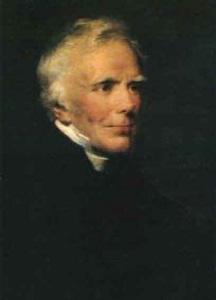De Engelse dichter en predikant John Keble werd geboren op geboren 25 april 1792 in Fairford, Gloucestershire. Keble werd na zijn studie in Oxford tot Fellow van Oriel College verkozen. Van 1831-1841 was hij hoogleraar poëzie. In 1822 ontmoette hij John Henry Newman. Zijn preek “National Apostasy”, die hij op 14 juli 1833 in Oxford hield, en waarin hij felle kritiek uitte op de steeds meer van het Christendom verwijderende staat, wordt beschouwd als het begin van de zogenaamde Oxford beweging, die de katholieke traditie binnen de Anglicaanse Kerk probeerde te herontdekken. Een andere belangrijke figuur van deze beweging was Edward Pusey Boverie. Zij schreven de zogenaamde “trakaten” die ver buiten Oxford bekend werden. Keble genoot binnen deze groep een speciale achting, want hij was al een gevestigde dichter en geleerde. In tegenstelling tot Newman bleef Keble zijn hele leven trouw aan Church of England. En niet alleen uit gemakzucht, maar uit echte overtuiging. Hij vertegenwoordigt daarmee de vleugel van de Oxford beweging die zichzelf bewust als onderdeel van deze kerk zag. Kebles in 1827 verschenen dichtbundel “The Christian Year” werd een van de grote klassiekers van de 19e eeuw. Het boek bevat een gedicht voor elke zon- en feestdag van het kerkelijk jaar en kende een grote verspreiding. Het maakte Keble beroemd. Er werden meer dan honderd edities van uitgegeven. In 1836 werd Keble predikant in Hursley (Winchester), waar hij bleef tot aan zijn dood. Hij trouwde op 10 oktober 1835 Charlotte Clarke, die een behulpzame vrouw voor de voorganger en dichter was. Keble College in Oxford werd opgericht in 1870 als een monument voor John Keble
First Sunday after Trinity
So Joshua smote all the country, . . . and all their kings; he left none remaining. _Joshua_ x. 40.
WHERE is the land with milk and honey flowing,
The promise of our God, our fancy’s theme?
Here over shattered walls dank weeds are growing,
And blood and fire have run in mingled stream;
Like oaks and cedars all around
The giant corses strew the ground,
And haughty Jericho’s cloud-piercing wall
Lies where it sank at Joshua’s trumpet call.
These are not scenes for pastoral dance at even,
For moonlight rovings in the fragrant glades,
Soft slumbers in the open eye of Heaven,
And all the listless joy of summer shades.
We in the midst of ruins live,
Which every hour dread warning give,
Nor may our household vine or fig-tree hide
The broken arches of old Canaan’s pride.
Where is the sweet repose of hearts repenting,
The deep calm sky, the sunshine of the soul,
Now Heaven and earth are to our bliss consenting,
And all the Godhead joins to make us whole.
The triple crown of mercy now
Is ready for the suppliant’s brow,
By the Almighty Three for ever planned,
And from behind the cloud held out by Jesus’ hand.
“Now, Christians, hold your own—the land before ye
Is open—win your way, and take your rest.”
So sounds our war-note; but our path of glory
By many a cloud is darkened and unblest:
And daily as we downward glide,
Life’s ebbing stream on either side
Shows at each turn some mouldering hope or joy,
The Man seems following still the funeral of the Boy.
Open our eyes, Thou Sun of life and gladness,
That we may see that glorious world of Thine!
It shines for us in vain, while drooping sadness
Enfolds us here like mist: come Power benign,
Touch our chilled hearts with vernal smile,
Our wintry course do Thou beguile,
Nor by the wayside ruins let us mourn,
Who have th’ eternal towers for our appointed bourne.

John Keble (25 april 1792 – 29 maart 1866)
Portret door George Richmond, 1863
